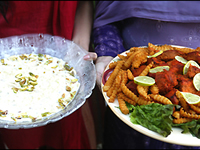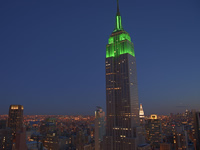 One of the unique pleasures of Ramadan is the tradition of specially prepared Ramadan sweets that originate from a host of different cultures and nationalities across the Muslim world. These Ramadan sweets and pastries help create a festive mood around the iftar table, and the best thing about Ramadan in America is that we get to sample them all. Just as the Muslim American community is a melting pot of diverse cultures, our Ramadan plates are adorned with treats from every corner of the Muslim world.
One of the unique pleasures of Ramadan is the tradition of specially prepared Ramadan sweets that originate from a host of different cultures and nationalities across the Muslim world. These Ramadan sweets and pastries help create a festive mood around the iftar table, and the best thing about Ramadan in America is that we get to sample them all. Just as the Muslim American community is a melting pot of diverse cultures, our Ramadan plates are adorned with treats from every corner of the Muslim world.
My parents immigrated from South Asia, so our house was filled with Ramadan treats from their homeland – seviyan (roasted noodles served in a sugary, milky sauce), fruit chaat (cut up fruits served with masala spices & black pepper), and of course, Rooh Afza (a sweet, rose-flavored milk drink).
But the mosque I attended while growing up was very multicultural, so I got a chance to experience the Ramadan treats of the parents of many of my friends. Kunafa (shredded, sweetened phyllo dough) from Syria, katayef (kind of like a fried sweet pancake) and umm ali (a decadent bread pudding) from Egypt, raisin cookies from Iran, and güllaç (phyllo again, with pomegranates and walnuts) from Turkey. There are tenuous cultural links between all of these desserts, but they each retain a cultural uniqueness that all can appreciate.
One intriguing adaptation of this tradition in the Western world is the development of a Ramadan chocolate calendar, a pop-up cardboard box with a chocolate treat for every day of Ramadan. Each fold out panel has a question and answer about key elements of Islam and the holy month. The calendar was created by, Neville Finlay, a British entrepreneur that made a name for himself creating halal versions of gummi bears and other treats for Muslims. My brother in the UK has been treating his daughter to the chocolates all month.
Incidentally, Findley is Jewish. For those who think that Muslims would be offended by something like this, Findley offers that he “has never been any friction with my customers” and sees “the whole thing as a fine example of peaceful multiculturalism.” In fact, his only negative feedback has been from a neo-Nazi group who voiced displeasure at Jews and Muslims working together.

